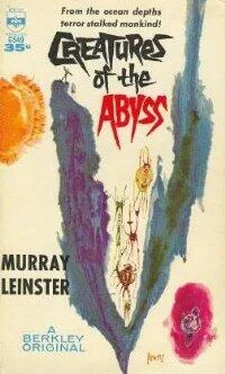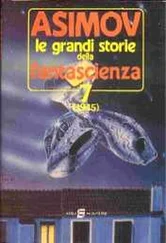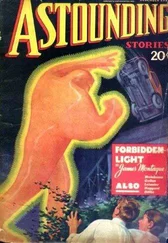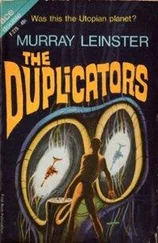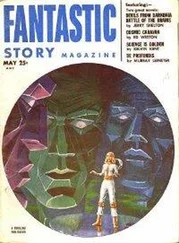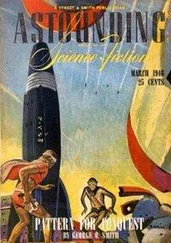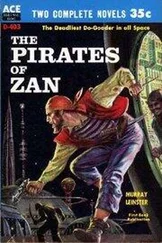“An interesting question,” said Davis. “We’ll try to find out how it happens. Even more interesting, I’d like to know why.”
He moved away along the deck. Terry went close to the side rail. A few minutes later the startling glare of one of the side searchlights smote upon the water away from the incredible scene. It moved slowly back and forth. Where the light struck, the sea seemed totally commonplace. No fish could be seen. Then the white beam swept here and there in jerky leapings. There was nothing unusual on the surface, nothing beyond the limit of brightness, where the sea turned dark.
Deirdre said at Terry’s side, “We didn’t really expect this! I’m going to get a sample of the water, Terry. Want to help?”
She ignored his haughty withdrawal of the afternoon, and he could not stand on his dignity in the presence of such an incredible phenomenon. She got a water bucket from the nearby rack. A wave sprung up as she tried to fill the bucket overside. It touched her hand and she cried out. Terry jerked her back by the shoulder. The bucket bumped against the Esperance’s side, hanging on the fine attached to the rail.
“What’s the matter?”
“It stung! The water stung! Like a nettle!” Shaking a little, Deirdre rubbed her wet hand with the other. “It doesn’t hurt now, but it was like a stinging nettle—or an electric shock!”
Terry hauled in the bucket and set it down. He leaned far over the rail. He plunged his hand into a lifting pinnacle of the sea. Instantly, his skin felt as if pricked by ten thousand needles. But his muscles did not contract as they would in an electric shock. The sensation was on the surface of his skin alone.
He shook his head impatiently. He put his finger in the bucket he’d lifted to the deck. There was no unusual sensation. He dipped overside again. Again acute and startling hurt, from the mere contact with the water.
Deirdre still rubbed her hand. She said in a queer, surprised voice, “Like pins and needles. It’s like—like the fish-driving paddle! But worse! Much worse!”
Terry looked again at the sea glittering with the swarms of fish in hopeless, panicked agitation, confined in a specific narrow compass by something unguessable. The searchlight continued to flick here and there. The Esperance drifted away from the edge of brightness. Terry put his hand overside once more, and once more he felt the stinging, nettle-like sensation. He got a fresh bucket of water from overside. On deck, there was no strange sensation when he dipped his hand in it.
The searchlight went out abruptly and only a faint and quickly dimming reddish glow came from it. That too died.
Davis’ voice gave orders. Terry said sharply, “Wait a minute!” He began to explain about the stinging of the water. But then he said, “Deirdre, you tell him! I’m going to put a submarine ear overboard. At the least we’ll get fish noises on a new scale. But I’ve got an idea … don’t sail into the bright circle yet.”
He got out the submarine ear and the recorder he’d made ready that afternoon. He started the recorder. Then he trailed the microphone overside. The sounds would be heard live through the speaker and they would be taped at the same time. At first, a blaring, confused sound came through. Terry turned down the volume.
He heard gruntings and chirpings and rustlings. Fish made those noises—not all fish, but certain species. These shrill, squeaking noises were the protests of frightened porpoises. But under and through all other sounds, a steady, unvarying hum could be easily detected. Terry had never heard anything quite like it. Its pitch was the same as that of a sixty-cycle frequency, but its tone quality was somehow sardonic and snarling. The word that came into Terry’s mind was “nasty.” Yes, it was a nasty sound. One didn’t like it. One would want to get away from it. In the air the same unpleasant sensation is produced by noises that make one’s flesh crawl.
Terry straightened up from where the recorder played upon the wet deck. Davis and Deirdre had come to listen, in the strange darkness under the sails of the Esperance.
“I’ve got a sort of hunch,” said Terry slowly. “Let’s sail across the bright patch. I’ll record the sea noises all the way. I’ve a feeling that that hum means something.”
“It’s not what you’d call an ordinary sound,” said Davis.
He raised his voice. One of the crew-cuts was at the schooner’s wheel. He spun it. The sails filled, and the rattling of flapping canvas died away. The Esperance gathered way and moved swiftly from the glittering circle, came about, and sailed again toward the shining area. She got closer and closer to the boundary.
The recorder continued to give out the confused and frightened noises of the sea creatures, but under and through their sounds there remained the nasty and sardonic hum. It grew louder and more unpleasant—much louder in proportion to the fish sounds. At the very boundary of the bright space it was loudest of all.
But as the yacht went on, the hum dimmed. At the very center of the circle where the glitterings were brightest, the humming sound was overwhelmed by the submarine tumult of senseless fish voices. Terry dipped his hand here. The tingling was almost tolerable, but not quite.
Davis hauled more buckets of water to the deck. In two of them he found some fish, so dense was the finny multitude. Then the yacht neared the farthest limit of the bright circle. The hum from the recording instrument grew progressively louder. Again, at the very edge of the shining water, it was loudest.
The Esperance sailed across the live boundary and into the dark sea. As the boat went on, the sound dimmed…
“Definitely loudest,” said Terry absorbedly, “at the edge of the circle of fish. At the line the fish couldn’t cross to escape. It is if there were an electric fence in the sea. It felt like that, too. But there isn’t any fence.”
Davis asked evenly, “Question: what holds them crowded?”
Terry said again, groping in his mind, “They act like fish in a closing net. I’ve seen something like this once, when a purse-seine was hauled. Those fish were frantic because they couldn’t get away. Just like these.”
“Why can’t they get away?” asked Davis grimly. “We haven’t seen anything holding them.”
“But we heard something,” pointed out Deirdre. “The hum. That may be what closes them in.”
Her father made a grunting noise. “We’ll see about that.”
He moved away, back to the stern. In moments, the Esperance was beating upwind. Presently, she headed back toward her previous position, but outside the brightness. Terry could see dark silhouettes moving about near the yacht’s wheel. Then he saw another brightness at the eastern horizon, but that was in the sky. Almost as soon as he noticed it, the moon peered over the edge of the world, and climbed slowly to full view, and then swam up among the lower-hanging stars.
Immediately, the look of the sea was different. The waves no longer seemed to race the darkness with only star glitters on their flanks. The figures at the Esperance’s stern were now quite distinct in the moonlight.
“You said a very sensible thing, Deirdre,” said Terry. “I thought of the fish-driving paddle and its effects, but I was ashamed to mention it. I thought it would sound foolish. But when you said it, it didn’t.”
“I have a talent,” said Deirdre, “for making foolish things sound sensible. Or perhaps the reverse. I’m going to say a sensible thing now. We haven’t had dinner. I’m going to fix something to eat.”
“You won’t get anybody to go belowdecks right now!” said Terry.
“I thought of that,” she told him. “Sandwiches.”
Читать дальше
